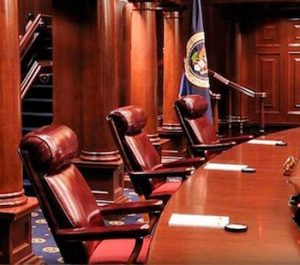 Halo Elecs., Inc. v. Pulse Elecs., Inc., (Fed. Cir. May 26, 2017) (Before Lourie, Moore, and Hughes, J.) (Opinion for the court, Lourie, J.)
Halo Elecs., Inc. v. Pulse Elecs., Inc., (Fed. Cir. May 26, 2017) (Before Lourie, Moore, and Hughes, J.) (Opinion for the court, Lourie, J.)
Halo Electronics, Inc. (“Halo”) sued Pulse Electronics, Inc. (“Pulse”) in 2007 for infringement of three patents (the “Halo patents”) in the District of Nevada. Pulse denied infringement and challenged the validity of the Halo patents. Following trial, the jury found that Pulse directly infringed the Halo patents, induced others to infringe the Halo patents, that Pulse’s infringement likely was willful, and that Halo’s asserted patent claims were not invalid for obviousness. The jury awarded Halo $1.5 million in reasonable royalty damages. After the post-trial briefing, the district court found that Pulse had not willfully infringed the Halo patents and entered judgment against Pulse in the amount of $1.5 million. Halo appealed the district court’s decision on willful infringement and its failure to enhance damages. The Federal Circuit affirmed.
The Supreme Court granted certiorari on the question of enhanced damages, ultimately reversing and remanding to the Federal Circuit. On remand, the Federal Circuit vacated the district court’s damages award and affirmed on all other grounds. The case was remanded to the district court on the issue of enhanced damages.
Before the Supreme Court granted Halo’s petition for certiorari, Halo filed a motion in the district court for supplemental damages and pre- and post-judgment interest, which Pulse opposed. While the case was pending on remand before the Federal Circuit, the district court awarded Halo pre-judgment and post-judgment interest, as well as supplemental damages for direct infringement. The court ordered the parties to either file a stipulation as to the amount of interest due or, if they disagreed on the calculation, file briefs explaining their positions. The parties disagreed and filed briefs contesting the appropriate amount of pre- and post-judgment interest. Pulse appealed to the Federal Circuit before the interest dispute was resolved.
The Federal Circuit addressed whether it had jurisdiction over the district court’s decision on pre- and post-judgment interest and supplemental damages. The Court found that it did not have jurisdiction under either 28 U.S.C. § 1295(a)(1) or 28 U.S.C. § 1292(c)(2), and dismissed the case.
The Federal Circuit has jurisdiction over “final decisions” of a district court under 28 U.S.C. § 1295(a)(1). A final decision is one that “ends the litigation on the merits and leaves nothing for the court to do but execute the judgment.” 28 U.S.C. § 1292(c)(2) is a narrow exception to the final judgment rule which gives the Court jurisdiction over an appeal from a judgment in a civil action for patent infringement when the case is final except for an accounting.
The Court first addressed whether the district court’s decision awarding Halo pre- and post-judgment interest and ordering the parties to either file a stipulation on the amount of interest or file briefs explaining their positions constituted a “final decision” appealable under § 1295(a)(1). The Court noted that the district court had not resolved the parties’ dispute on the calculation of pre- and post-judgment interest before Pulse appealed. As a result and based on Supreme Court precedent, the Court found that the district court’s pre- and post-judgment interest decision was not “final” because the court had not “determine[d], or specif[ied] the means for determining the amount” of interest. See United States v. F & M Schaefer Brewing Co., 356 U.S. 227, 233 (1958). The Court, therefore, lacked jurisdiction under § 1295(a)(1).
The Court similarly held that it lacked jurisdiction under the narrow exception in § 1292(c)(2).
Citing earlier Federal Circuit precedent, the Court noted that jurisdiction only exists under § 1292(c)(2) if the order appealed from is considered “final” under §1295. Because the order appealed from was itself not “final” under § 1295, as discussed above, the Court lacked jurisdiction under § 1292(c)(2). The Court noted that its decision was the same regardless of whether the calculation of interest is considered part of an “accounting” under § 1292(c)(2).
If a dispute over a judgment for money, such as pre-judgment interest, is not resolved before appeal, the case may be dismissed for lack of jurisdiction.
[Troutman-Ad]
[Troutman-About]

![[IPWatchdog Logo]](https://ipwatchdog.com/wp-content/themes/IPWatchdog%20-%202023/assets/images/temp/logo-small@2x.png)


![[Advertisement]](https://ipwatchdog.com/wp-content/uploads/2024/04/UnitedLex-May-2-2024-sidebar-700x500-1.jpg)
![[Advertisement]](https://ipwatchdog.com/wp-content/uploads/2024/04/Artificial-Intelligence-2024-REPLAY-sidebar-700x500-corrected.jpg)
![[Advertisement]](https://ipwatchdog.com/wp-content/uploads/2024/04/Patent-Litigation-Masters-2024-sidebar-700x500-1.jpg)

![[Advertisement]](https://ipwatchdog.com/wp-content/uploads/2021/12/WEBINAR-336-x-280-px.png)
![[Advertisement]](https://ipwatchdog.com/wp-content/uploads/2021/12/2021-Patent-Practice-on-Demand-recorded-Feb-2021-336-x-280.jpg)
![[Advertisement]](https://ipwatchdog.com/wp-content/uploads/2021/12/Ad-4-The-Invent-Patent-System™.png)






Join the Discussion
No comments yet.